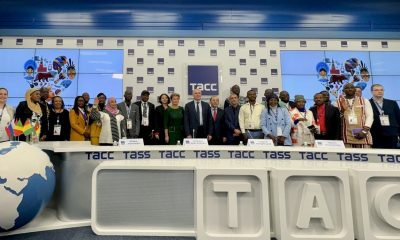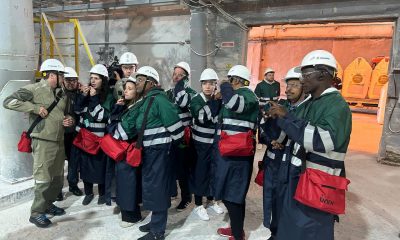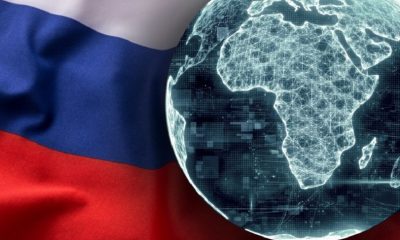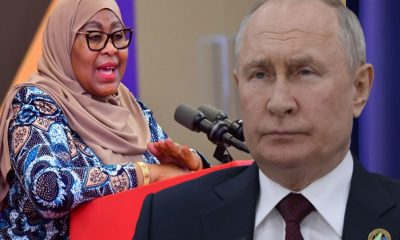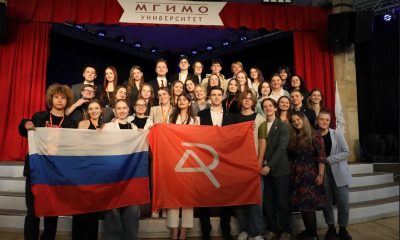World
The Balancing Act of Diplomacy: How Russia Struggles to Appear on Africa’s Horizon
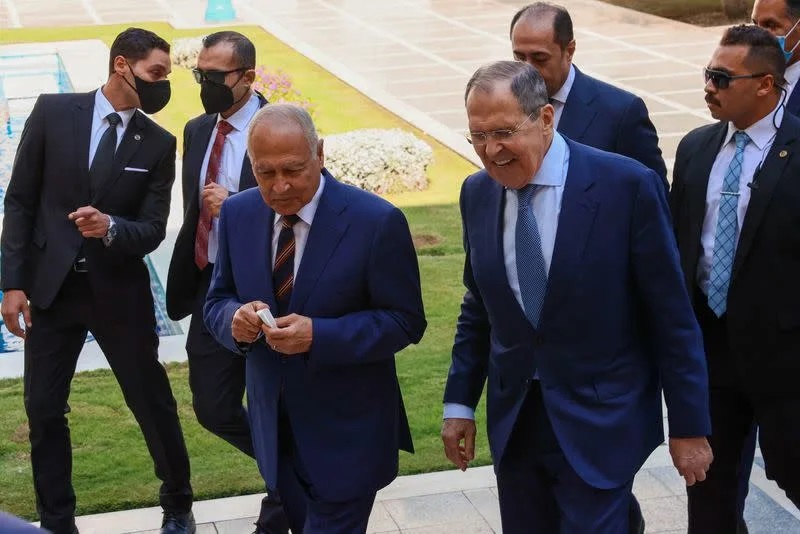
By Kestér Kenn Klomegâh
As popularly known to African leaders, Russia has thousands of decade-old undelivered pledges and several bilateral agreements signed with individual countries, yet to be implemented, in the continent.
In addition, during the previous years, there has been an unprecedented huge number of “working visits” by state officials both ways, to Africa and to the Russian Federation.
In an authoritative policy report presented last November titled Situation Analytical Report and prepared by 25 Russian policy experts, it was noted that Russia’s Africa policy is roughly divided into four periods, previously after the Soviet’s collapse in 1991. After the first summit held in October 2019, Russia’s relations with Africa have entered its fifth stage.
According to that report, “the intensification of political contacts is only with a focus on making them demonstrative.” Russia’s foreign policy strategy regarding Africa needs to spell out and incorporate the development needs of African countries. The number of high-level meetings has increased but the share of substantive issues on the agenda remains small. There are few definitive results from such meetings. Next, there has been a lack of coordination among various state and para-state institutions working with Africa.
Despite the above objective criticisms or better still the research findings, Foreign Minister Sergey Lavrov’s trip to four African countries on 24-27 July still has considerable geopolitical significance and some implications. The four African countries on his travel agenda were Egypt, Ethiopia, Uganda and the Republic of the Congo.
In a pre-departure interview with local Russian media, Lavrov shared reflections on the prospects for Russia-African relations within the context of the current geopolitical and economic changes, fearing isolation with tough sanctions after Russia’s February 24 “special military operation” in Ukraine.
He unreservedly used, at least, the media platform to clarify Russia’s view of the war and attract allies outside the West, and rejected the West’s accusations that Russia is responsible for the current global economic crisis and instability.
Reports said African countries are among those most affected by the ripples of the war. There are, however, other natural causes such as long seasonal droughts that complicated the situation in Africa.
Lavrov reiterated an assurance that Russian grain “commitments” would be fulfilled and offered nothing more to cushion the effects of the cost-of-living crisis. In a contrast, at least, the United States offered a $1.3 billion package to help tackle hunger in Africa’s Horn.
It is a historical fact that Russia’s ties with Africa declined with the collapse of the Soviet Union in 1991. The official transcripts made available after Lavrov’s meetings in Egypt offered little, much has already been said about developments in the North African and Arab world, especially those including Libya, Syria and Yemen, as well as the Palestinian-Israeli conflicts.
With the geographical location of Egypt, Lavrov’s visit has tacit implications. It followed US President Joe Biden’s first visit to the Middle East, during which he visited Israel, the Palestinian territories and Saudi Arabia. Biden also took part in a summit of the six member states of the Gulf Cooperation Council, in addition to Egypt, Jordan and Iraq.
Lavrov’s efforts toward building non-Western ties at this crucial time are highly commendable, especially with the Arab League Secretary-General Ahmed Aboul Gheit and representatives from the organization’s 22 member states. Egypt has significant strategic and economic ties with Russia. There are two major projects namely the building of nuclear plants, the contract signed back in 2015 and the construction of an industrial zone has been on the planning table these several years.
In the aftermath of the Soviet Union, Russia continues efforts in search of possible collaboration and opportunities for cooperation in the past years.
For the first time in the Republic of Congo, Lavrov delivered a special message from President Vladimir Putin to the Congolese President Denis Sassou Nguesso, at his residence in Oyo, a town 400 kilometres north of the capital, Brazzaville. Kremlin records show that Sassou-Nguesso, who has been in power since 1979, last visited Moscow in May 2019 and before that in November 2012.
The Congolese leader during his visit apparently asked for Russia’s greater engagement and assistance in bringing total peace and stability in Central Africa comprising the Congo, Democratic Republic of the Congo, Central African Republic, Cameroon and Chad.
This presents a considerable interest especially its “military-technical cooperation” to further crash French domination similar to the Republic of Mali in West Africa.
Interviews made by this author confirmed that Russia would send more military experts from Wagner Group to DRC through the Central African Republic.
An insider at the Congo’s Foreign Affairs Ministry confirmed the special message relates to an official invitation for Congolese President Sassou-Nguesso to visit Moscow.
Understanding the political developments and much talked about transition (better to describe it as hereditary succession) of the regime from President Yoweri Museveni to his son, Muhoozi Kainerugaba, unquestionably brings Lavrov to Uganda. For Museveni, drawing closer to Russia sends a critical message about the motives for relations between Uganda and Russia.
With Foreign Minister of Uganda Jeje Odongo in the city of Entebbe, Lavrov in the same traditional rhetoric mentioned “the implementation of joint projects in oil refining, energy, transport infrastructure and agricultural production.”
It was decided to focus on practical efforts to move the above areas of focus forward in the course of an Intergovernmental Russian-Ugandan Commission on Economic, Scientific and Technical Cooperation meeting in October.
Interesting to recall that during President Vladimir Putin’s meeting on December 11, 2012, President Museveni said “Moscow is a kind of Mecca for free movements in Africa. Muslims visit Mecca as a religious ritual, while Moscow is a kind of centre that helps various liberation movements.” Later in October 2019, Museveni expressed appreciation for the Africa–Russia meeting.
“It is good to say at this meeting a few areas which we could look at. Number one is defence and security. We have supported building an army by buying good Russian equipment, aircraft, tanks, and so on. We want to buy more. We have been paying cash in the past, cash, cash, cash. What I propose is that you supply and we pay. That would be some sort of supply that would make us build faster because now we pay cash like for this Sukhoi jet, we paid cash,” Museveni said during the conversation told Putin.
Lavrov displays his passion for historical references. In many of his speeches during the four-nation tour, he repeatedly stressed that it’s imperative for African leaders to support its “special military operation” in Ukraine, repeated all the Soviet assistance to Africa and the perspectives for the future of Russia-African relations. But most essentially, Lavrov has to understand that little has been achieved, both the long period before and after the first Russia-Africa summit held in October 2019.
In Ethiopia where the African Union headquarters is located, and representatives of African countries are based, Russia is vying to normalize an international order and frame-shape its geostrategic posture in this capital city.
Whether 25 of Africa’s 54 states abstained or did not vote to condemn Russia at the UN General Assembly resolution in March, Africans are overwhelmingly pragmatic. Most of them displayed neutrality, creating the basis for accepting whatever investment and development finance from the United States, the European Union, the Asian region, Russia and China, from every other region of the world.
For external players including Russia eyeing Africa, Museveni’s thought-provoking explanation of “neutrality” during the media conference re-emphasizes the best classic diplomacy of pragmatism. “We don’t believe in being enemies of somebody’s enemy,” Museveni told Lavrov. Uganda is set to assume the chairmanship of the Non-Aligned Movement, a global body created during the Cold War by countries that wanted to escape being drifted into the geopolitical and ideological rivalry between Western powers and Communists.
Lavrov, however, informed about broadening African issues in the “new version of Russia’s Foreign Policy Concept against the background of the waning of the Western direction” and his will objectively increase the share of the African direction in the work of the Foreign Ministry. Relating to the next summit, scheduled for mid-2023, “a serious package of documents that will contain almost all significant agreements” is being prepared, he said.
Lavrov with his Ethiopian counterpart Demeke Mekonnnen and the African Union leadership in Addis Ababa have agreed on additional documents paving the way to a more efficient dialogue in the area of defence sales and contracts.
Still on Ethiopia, Russia’s state-run nuclear corporation Rosatom and Ethiopia’s Ministry of Innovation and Technology signed a roadmap on cooperation in projects to build a nuclear power plant and a nuclear research centre in the republic. In addition, other bilateral issues, including joint energy and infrastructure projects, and education were discussed.
“We have good traditions in the sphere of military and technical cooperation. Today, we confirmed our readiness to implement new plans in this sphere, including taking into account the interests of our Ethiopian friends in ensuring their defensive ability,” the Russian top diplomat said.
“Russia is ready to continue providing assistance to Ethiopia in training its domestic specialists in various spheres,” he added and finally explaining that Moscow was ready to develop both bilateral humanitarian and cultural contacts and cooperation in the sphere of education with Addis Ababa.
According to Lavrov, Russia has had long-standing good relations with Africa since the days of the Soviet Union which pioneered movements that culminated in decolonization. It provided assistance to the national liberation movements and then to the restoration of independent states and the rise of their economies in Africa. An undeniable fact is that many external players have also had long-term relations and continue bolstering political, economic and social ties in the continent.
In his Op-Ed article, Lavrov argues: “We have been rebuilding our positions for many years now. The Africans are reciprocating. They are interested in having us. It is good to see that our African friends have a similar understanding with Russia.” The point is that Moscow is desirous to widen and deepen its presence in the continent. On the other hand, the Maghreb and African countries are, in terms of reciprocity, keen to strengthen relations with Moscow, but will avoid taking sides in the Russia-Ukraine crisis.
Lavrov has successfully ended his meetings and talks in Africa. Now, the basic significant issue in its current relations is still the fact that Russia has thousands of decade-old undelivered pledges and several bilateral agreements signed with individual countries in the continent, while in the previous years there has been an unprecedented huge number of “working visits” to Africa. The development of a comprehensive partnership with African countries remains among the top priorities of Russia’s foreign policy, Moscow is open to its further build-up, Lavrov said in an Op-Ed article for the African media, and originally published on the ministry’s website.
Steven Gruzd, the Head of the Russia-Africa Programme at the South African Institute of International Affairs (SAIIA), told Fox News Digital. “Africa’s leaders must realize that they might be used as props in the grand geopolitical theatre being led by these big powers.” Moscow opposes a unipolar world based only on Western interests and pursues Africa to condemn sanctions imposed against Russia.
He believes that this diplomatic jockeying risks casting African countries “as pawns in a grand chess game” and African countries have to steer clear of taking sides. However, many African countries are wary of losing Western aid and trade ties should they go all in with the Kremlin.
“They need to be very clear about the risks and rewards of these meetings”, added Gruzd. “Most do not want to have to choose between Russia and the West and will try to maintain relationships with both sides. This is definitely a Russian move to show they are not isolated, and what better way to do it than Minister Lavrov smiling and shaking hands with African presidents and foreign ministers?”
In the context of rebuilding post-Soviet relations and now attempting at creating a new model of the global order which it hopes to lead after exiting from international organizations. In order to head an emerging global order, Russia needs to be more open, and make more inroads into the civil society, rather than close (isolate) itself from “non-Western friends” during this fast-changing crucial period – in Asia, Africa and Latin America. For instance, Africa is ready as it holds huge opportunities in various sectors for reliable, genuine and committed investors. It offers a very profitable investment destination.
Despite criticisms, China has built an exemplary distinctive economic power in Africa. Besides China, Africa is largely benefitting from the European Union and Western aid flows, and economic and trade ties. Russia plays very little role in Africa’s infrastructure, agriculture and industry, and makes little effort in leveraging the African Continental Free Trade Area (AfCFTA). Our monitoring shows that the Russian business community hardly pays attention to the significance of AfCFTA which provides a unique and valuable platform for businesses to access an integrated African market of over 1.3 billion people.
Substantively, Russia brings little to the continent, especially in the economic sectors that badly need investment. Of course, Russia basks in restoring and regaining part of its Soviet-era influence, but has problems with planning and tackling its set tasks, a lack of confidence in fulfilling its policy targets. The most important aspect is how to make strategic efforts more practical, more consistent and more effective with African countries. Without these fundamental factors, it would therefore be an illusionary step to partnering with Africa.
Some policy experts have classified three directions for external partners dealing with Africa: (i) active engagement, (ii) sitting on the sideline and observing, and (iii) being a passive player. From all indications, African leaders have political sympathy and most often express either support or a neutral position for Russia. But at the same time, African leaders are very pragmatic, indiscriminately dealing with external players with adequate funds to invest in different economic sectors. Africa is in a globalized world. It is, generally, beneficial for Africa as it could take whatever is offered from either East or West, North or South.
In stark contrast to key global players for instance the United States, China and the European Union and many others, Russia has limitations. For Russia to regain a part of its Soviet-era influence, it has to address its own policy approach, this time shifting towards new paradigms – to implement some of the decade-old pledges and promises, and those bilateral agreements; secondly to promote development-oriented policies and how to make these strategic efforts more practical, more consistent, more effective and most admirably result-oriented with African countries.
Perhaps, reviewing or revisiting the school geography, Russia is not only by far the world’s largest country, surface-wise, but arguably also by far the wealthiest in terms of natural resources. Thus, the question is – what else could be Russia’s standing blocks in building its economic power, by investing in the needed sustainable development (not humanitarian aid), in Africa?
World
AfBD, AU Renew Call for Visa-Free Travel to Boost African Economic Growth

By Adedapo Adesanya
The African Development Bank (AfDB) and the African Union have renewed their push for visa-free travel to accelerate Africa’s economic transformation.
The call was reinforced at a High-Level Symposium on Advancing a Visa-Free Africa for Economic Prosperity, where African policymakers, business leaders, and development institutions examined the need for visa-free travel across the continent.
The consensus described the free movement of people as essential to unlocking Africa’s economic transformation under the African Continental Free Trade Area (AfCFTA).
The symposium was co-convened by AfDB and the African Union Commission on the margins of the 39th African Union Summit of Heads of State and Government in Addis Ababa.
The participants framed mobility as the missing link in Africa’s integration agenda, arguing that while tariffs are falling under AfCFTA, restrictive visa regimes continue to limit trade in services, investment flows, tourism, and labour mobility.
On his part, Mr Alex Mubiru, Director General for Eastern Africa at the African Development Bank Group, said that visa-free travel, interoperable digital systems, and integrated markets are practical enablers of enterprise, innovation, and regional value chains to translate policy ambitions into economic activity.
“The evidence is clear. The economics support openness. The human story demands it,” he told participants, urging countries to move from incremental reforms to “transformative change.”
Ms Amma A. Twum-Amoah, Commissioner for Health, Humanitarian Affairs and Social Development at the African Union Commission, called for faster implementation of existing continental frameworks.
She described visa openness as a strategic lever for deepening regional markets and enhancing collective responses to economic and humanitarian crises.
Former AU Commission Chairperson, Ms Nkosazana Dlamini-Zuma, reiterated that free movement is central to the African Union’s long-term development blueprint, Agenda 2063.
“If we accept that we are Africans, then we must be able to move freely across our continent,” she said, urging member states to operationalise initiatives such as the African Passport and the Free Movement of Persons Protocol.
Ghana’s Trade and Industry Minister, Mrs Elizabeth Ofosu-Adjare, shared her country’s experience as an early adopter of open visa policies for African travellers, citing increased business travel, tourism, and investor interest as early dividends of greater openness.
The symposium also reviewed findings from the latest Africa Visa Openness Index, which shows that more than half of intra-African travel still requires visas before departure – seen by participants as a significant drag on intra-continental commerce.
Mr Mesfin Bekele, Chief Executive Officer of Ethiopian Airlines, called for full implementation of the Single African Air Transport Market (SAATM), saying aviation connectivity and visa liberalisation must advance together to enable seamless travel.
Regional representatives, including Mr Elias Magosi, Executive Secretary of the Southern Africa Development Community, emphasised the importance of building trust through border management and digital information-sharing systems.
Ms Gabby Otchere Darko, Executive Chairman of the Africa Prosperity Network, urged governments to support the “Make Africa Borderless Now” campaign, while tourism campaigner Ras Mubarak called for more ratifications of the AU Free Movement of Persons protocol.
Participants concluded that achieving a visa-free Africa will require aligning migration policies, digital identity systems, and border infrastructure, alongside sustained political commitment.
World
Nigeria Exploring Economic Potential in South America, Particularly Brazil

By Kestér Kenn Klomegâh
In this interview, Uche Uzoigwe, Secretary-General of NIDOA-Brazil, discusses the economic potential in South America, particularly Brazil, and investment incentives for Brazilian corporate partners for the Federal Republic of Nigeria (FRN). Follow the discussion here:
How would you assess the economic potential in the South American region, particularly Brazil, for the Federal Republic of Nigeria? What investment incentives does Nigeria have for potential corporate partners from Brazil?
As the Secretary of NIDOA Brazil, my response to the questions regarding the economic potentials in South America, particularly Brazil, and investment incentives for Brazilian corporate partners would be as follows:
Brazil, as the largest economy in South America, presents significant opportunities for the Federal Republic of Nigeria. The country’s diverse economy is characterised by key sectors such as agriculture, mining, energy, and technology. Here are some factors to consider:
- Natural Resources: Brazil is rich in natural resources like iron ore, soybeans, and biofuels, which can be beneficial to Nigeria in terms of trade and resource exchange.
- Growing Agricultural Sector: With a well-established agricultural sector, Brazil offers potential collaboration in agri-tech and food security initiatives, which align with Nigeria’s goals for agricultural development.
- Market Size: Brazil boasts a large consumer market with a growing middle class. This represents opportunities for Nigerian businesses looking to export goods and services to new markets.
- Investment in Infrastructure: Brazil has made significant investments in infrastructure, which could create opportunities for Nigerian firms in construction, engineering, and technology sectors.
- Cultural and Economic Ties: There are historical and cultural ties between Nigeria and Brazil, especially considering the African diaspora in Brazil. This can facilitate easier business partnerships and collaborations.
In terms of investment incentives for potential corporate partners from Brazil, Nigeria offers several attractive incentives for Brazilian corporate partners, including:
- Tax Incentives: Various tax holidays and concessions are available under the Nigerian government’s investment promotion laws, particularly in key sectors like agriculture, manufacturing, and technology.
- Repatriation of Profits: Brazil-based companies investing in Nigeria can repatriate profits without restrictions, thus enhancing their financial viability.
- Access to the African Market: Investment in Nigeria allows Brazilian companies to access the broader African market, benefiting from Nigeria’s membership in regional trade agreements such as ECOWAS.
- Free Trade Zones: Nigeria has established free trade zones that offer companies the chance to operate with reduced tariffs and fewer regulatory burdens.
- Support for Innovation: The Nigerian government encourages innovation and technology transfer, making it attractive for Brazilian firms in the tech sector to collaborate, particularly in fintech and agriculture technology.
- Collaborative Ventures: Opportunities exist for joint ventures with local firms, leveraging local knowledge and networks to navigate the business landscape effectively.
In conclusion, fostering a collaborative relationship between Nigeria and Brazil can unlock numerous economic opportunities, leading to mutual growth and development in various sectors. We welcome potential Brazilian investors to explore these opportunities and contribute to our shared economic goals.
In terms of this economic cooperation and trade, what would you say are the current practical achievements, with supporting strategies and systemic engagement from NIDOA?
As the Secretary of NIDOA Brazil, I would highlight the current practical achievements in economic cooperation and trade between Nigeria and Brazil, alongside the supporting strategies and systemic engagement from NIDOA.
Here are some key points:
Current Practical Achievements
- Increased Bilateral Trade: There has been a notable increase in bilateral trade volume between Nigeria and Brazil, particularly in sectors such as agriculture, textiles, and technology. Recent trade agreements and discussions have facilitated smoother trade relations.
- Joint Ventures and Partnerships: Successful joint ventures have been established between Brazilian and Nigerian companies, particularly in agriculture (e.g., collaboration in soybean production and agricultural technology) and energy (renewables, oil, and gas), demonstrating commitment to mutual development.
- Investment in Infrastructure Development: Brazilian construction firms have been involved in key infrastructure projects in Nigeria, contributing to building roads, bridges, and facilities that enhance connectivity and economic activity.
- Cultural and Educational Exchange Programs: Programs facilitating educational exchange and cultural cooperation have led to strengthened ties. Brazilian universities have partnered with Nigerian institutions to promote knowledge transfer in various fields, including science, technology, and arts.
Supporting Strategies
- Strategic Trade Dialogue: NIDOA has initiated regular dialogues between trade ministries of both nations to discuss trade barriers, potential markets, and cooperative opportunities, ensuring both countries are aligned in their economic goals.
- Investment Promotion Initiatives: Targeted initiatives have been established to promote Brazil as an investment destination for Nigerian businesses and vice versa. This includes showcasing success stories at international trade fairs and business forums.
- Capacity Building and Technical Assistance: NIDOA has offered capacity-building programs focused on enhancing Nigeria’s capabilities in agriculture and technology, leveraging Brazil’s expertise and sustainable practices.
- Policy Advocacy: Continuous advocacy for favourable trade policies has been a key focus for NIDOA, working to reduce tariffs and promote economic reforms that facilitate investment and trade flows.
Systemic Engagement
- Public-Private Partnerships (PPPs): Engaging the private sector through PPPs has been essential in mobilising resources for development projects. NIDOA has actively facilitated partnerships that leverage both public and private investments.
- Trade Missions and Business Delegations: Organised trade missions to Brazil for Nigerian businesses and vice versa, allowing for direct engagement with potential partners, fostering trust and opening new channels for trade.
- Monitoring and Evaluation: NIDOA implements a rigorous monitoring and evaluation framework to assess the impact of various initiatives and make necessary adjustments to strategies, ensuring effectiveness in achieving economic cooperation goals.
Through these practical achievements, supporting strategies, and systemic engagement, NIDOA continues to play a pivotal role in enhancing economic cooperation and trade between Nigeria and Brazil. By fostering collaboration and leveraging shared resources, we aim to create a sustainable and mutually beneficial economic environment that promotes growth for both nations.
Do you think the changing geopolitical situation poses a number of challenges to connecting businesses in the region with Nigeria, and how do you overcome them in the activities of NIDOA?
The changing geopolitical situation indeed poses several challenges for connecting businesses in the South American region, particularly Brazil, with Nigeria. These challenges include trade tensions, shifting alliances, currency fluctuations, and varying regulatory environments. Below, I will outline some of the specific challenges and how NIDOA works to overcome them:
Current Challenges
- No Direct Flights: This challenge is obviously explicit. Once direct flights between Brazil and Nigeria become active, and hopefully this year, a much better understanding and engagement will follow suit.
- Trade Restrictions and Tariffs: Increasing trade protectionism in various regions can lead to higher tariffs and trade barriers that hinder the movement of goods between Brazil and Nigeria.
- Currency Volatility: Fluctuations in the value of currencies can complicate trade agreements, pricing strategies, and overall financial planning for businesses operating in both Brazil and Nigeria.
- Different regulatory frameworks and compliance requirements in both countries can create challenges for businesses aiming to navigate these systems efficiently.
- Supply Chain Disruptions: Changes in global supply chains due to geopolitical factors may disrupt established networks, impacting businesses relying on imports and exports between the two nations.
Overcoming Challenges through NIDOA.
NIDOA actively engages in discussions with both the Brazilian and Nigerian governments to advocate for favourable trade policies and agreements that reduce tariffs and improve trade conditions. This year in October, NIDOA BRAZIL holds its TRADE FAIR in São Paulo, Brazil.
What are the popular sentiments among the Nigerians in the South American diaspora? As the Secretary-General of the NIDOA, what are your suggestions relating to assimilation and integration, and of course, future perspectives for the Nigerian diaspora?
As the Secretary-General of NIDOA, I recognise the importance of understanding the sentiments among Nigerians in the South American diaspora, particularly in Brazil.
Many Nigerians in the diaspora take pride in their cultural roots, celebrating their heritage through festivals, music, dance, and culinary traditions. This cultural expression fosters a sense of community and belonging.
While many individuals embrace their new environments, they often face challenges related to cultural differences, language barriers, and social integration, which can lead to feelings of isolation.
Many express optimism about opportunities in education, business, and cultural exchange, viewing their presence in South America as a chance to expand their horizons and contribute to economic activities both locally and back in Nigeria.
Sentiments regarding acceptance vary; while some Nigerians experience warmth and hospitality, others encounter prejudice or discrimination, which can impact their overall experience in the host country. NIDOA BRAZIL has encouraged the formation of community organisations that promote networking, cultural exchange, and social events to foster a sense of belonging and support among Nigerians in the diaspora. There are currently two forums with over a thousand Nigerian members.
Cultural Education and Awareness Programs: NIDOA BRAZIL organises cultural education programs that showcase Nigerian heritage to local communities, promoting mutual understanding and appreciation that can facilitate smoother integration.
Language and Skills Training: NIDOA BRAZIL provides language courses and skills training programs to help Nigerians, especially students in tertiary institutions, adapt to their new environment, enhancing communication and employability within the host country.
Engaging in Entrepreneurship: NIDOA BRAZIL supports the entrepreneurial spirit among Nigerians in the diaspora by facilitating access to resources, mentorship, and networks that can help them start businesses and create economic opportunities.
Through its AMBASSADOR’S CUP COMPETITION, NIDOA Brazil has engaged students of tertiary institutions in Brazil to promote business projects and initiatives that can be implemented in Nigeria.
NIDOA BRAZIL also pushes for increased tourism to Brazil since Brazil is set to become a global tourism leader in 2026, with a projected 10 million international visitors, driven by a post-pandemic rebound, enhanced air connectivity, and targeted marketing strategies.
Brazil’s tourism sector is poised for a remarkable milestone in 2026, as the country expects to welcome over 10 million international visitors—surpassing the previous record of 9.3 million in 2025. This expected surge represents an ambitious leap, nearly doubling the country’s foreign-arrival numbers within just four years, a feat driven by a combination of pent-up global demand, strategic air connectivity improvements, and a highly targeted marketing campaign.
World
African Visual Art is Distinguished by Colour Expression, Dynamic Form—Kalalb

By Kestér Kenn Klomegâh
In this insightful interview, Natali Kalalb, founder of NAtali KAlalb Art Gallery, discusses her practical experiences of handling Africa’s contemporary arts, her professional journey into the creative industry and entrepreneurship, and also strategies of building cultural partnership as a foundation for Russian-African bilateral relations. Here are the interview excerpts:
Given your experience working with Africa, particularly in promoting contemporary art, how would you assess its impact on Russian-African relations?
Interestingly, my professional journey in Africa began with the work “Afroprima.” It depicted a dark-skinned ballerina, combining African dance and the Russian academic ballet tradition. This painting became a symbol of cultural synthesis—not opposition, but dialogue.
Contemporary African art is rapidly strengthening its place in the world. By 2017, the market was growing so rapidly that Sotheby launched its first separate African auction, bringing together 100 lots from 60 artists from 14 foreign countries, including Algeria, Ghana, Mali, Nigeria, Senegal, and others. That same year during the Autumn season, Louis Vuitton Foundation in Paris hosted a major exhibition dedicated to African art. According to Artnet, sales of contemporary African artists reached $40 million by 2021, a 434% increase in just two years. Today, Sotheby holds African auctions twice a year, and in October 2023, they raised $2.8 million.
In Russia, this process manifests itself through cultural dialogue: exhibitions, studios, and educational initiatives create a space of trust and mutual respect, shaping the understanding of contemporary African art at the local level.
Do you think geopolitical changes are affecting your professional work? What prompted you to create an African art studio?
The international context certainly influences cultural processes. However, my decision to work with African themes was not situational. I was drawn to the expressiveness of African visual language—colour, rhythm, and plastic energy. This theme is practically not represented systematically and professionally in the Russian art scene.
The creation of the studio was a step toward establishing a sustainable platform for cultural exchange and artistic dialogue, where the works of African artists are perceived as a full-fledged part of the global cultural process, rather than an exotic one.
To what extent does African art influence Russian perceptions?
Contemporary African art is gradually changing the perception of the continent. While previously viewed superficially or stereotypically, today viewers are confronted with the depth of artistic expression and the intellectual and aesthetic level of contemporary artists.
Portraits are particularly impactful: they allow us to see not just an abstract image of a “continent,” but a concrete personality, character, and inner dignity. Global market growth data and regular auctions create additional trust in African contemporary art and contribute to its perception as a mature and valuable movement.
Does African art reflect lifestyle and fashion? How does it differ from Russian art?
African art, in my opinion, is at its peak in everyday culture—textiles, ornamentation, bodily movement, rhythm. It interacts organically with fashion, music, interior design, and the urban environment. The Russian artistic tradition is historically more academic and philosophical. African visual art is distinguished by greater colour expression and dynamic form. Nevertheless, both cultures are united by a profound symbolic and spiritual component.
What feedback do you receive on social media?
Audience reactions are generally constructive and engaging. Viewers ask questions about cultural codes, symbolism, and the choice of subjects. The digital environment allows for a diversity of opinions, but a conscious interest and a willingness to engage in cultural dialogue are emerging.
What are the key challenges and achievements of recent years?
Key challenges:
- Limited expert base on African contemporary art in Russia;
- Need for systematic educational outreach;
- Overcoming the perception of African art as exclusively decorative or ethnic.
Key achievements:
- Building a sustainable audience;
- Implementing exhibition and studio projects;
- Strengthening professional cultural interaction and trust in African
contemporary art as a serious artistic movement.
What are your future prospects in the context of cultural diplomacy?
Looking forward, I see the development of joint exhibitions, educational programs, and creative residencies. Cultural diplomacy is a long-term process based on respect and professionalism. If an artistic image is capable of uniting different cultural traditions in a single visual space, it becomes a tool for mutual understanding.
-

 Feature/OPED6 years ago
Feature/OPED6 years agoDavos was Different this year
-
Travel/Tourism10 years ago
Lagos Seals Western Lodge Hotel In Ikorodu
-

 Showbiz3 years ago
Showbiz3 years agoEstranged Lover Releases Videos of Empress Njamah Bathing
-

 Banking8 years ago
Banking8 years agoSort Codes of GTBank Branches in Nigeria
-

 Economy3 years ago
Economy3 years agoSubsidy Removal: CNG at N130 Per Litre Cheaper Than Petrol—IPMAN
-

 Banking3 years ago
Banking3 years agoSort Codes of UBA Branches in Nigeria
-

 Banking3 years ago
Banking3 years agoFirst Bank Announces Planned Downtime
-

 Sports3 years ago
Sports3 years agoHighest Paid Nigerian Footballer – How Much Do Nigerian Footballers Earn




